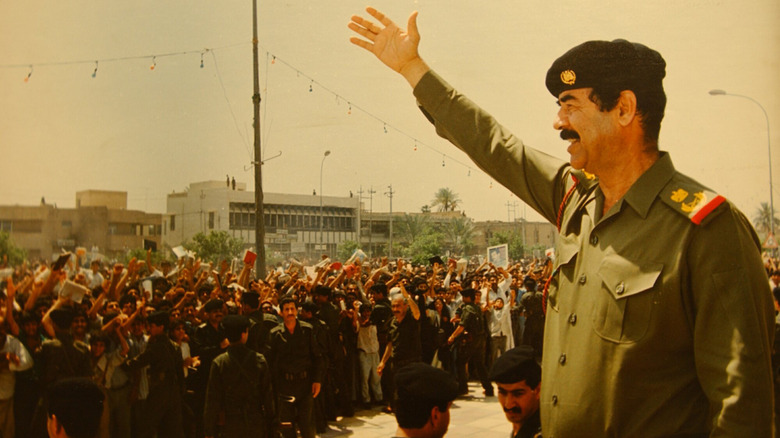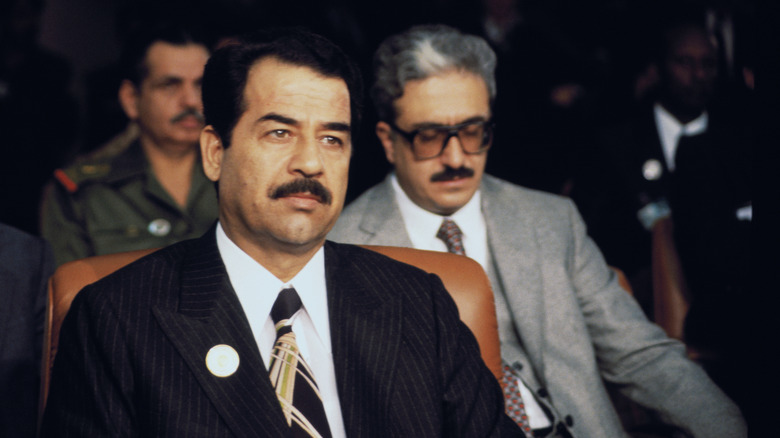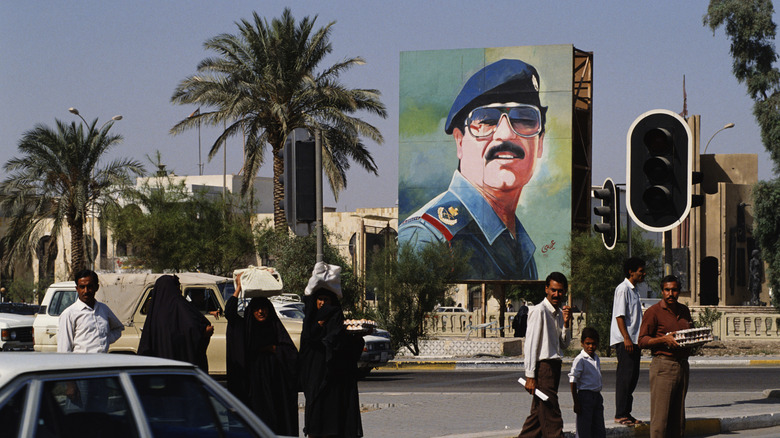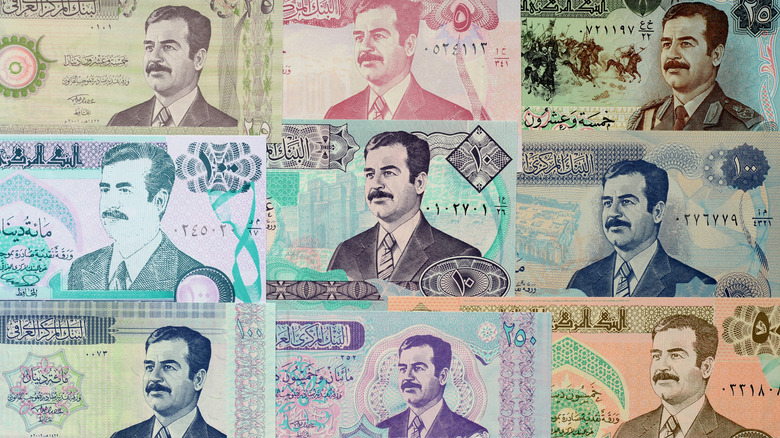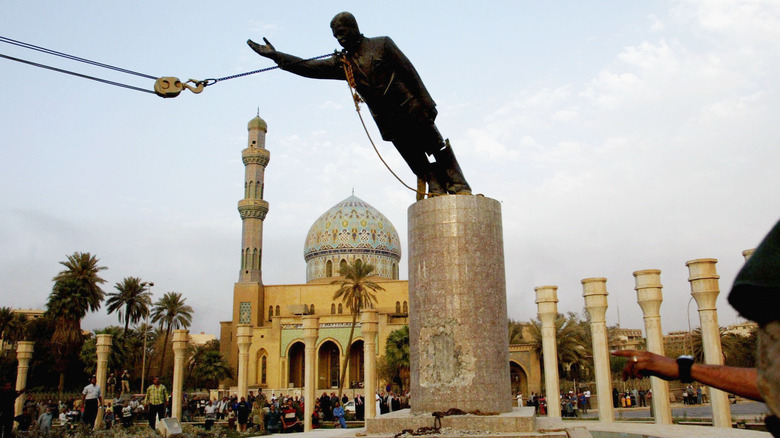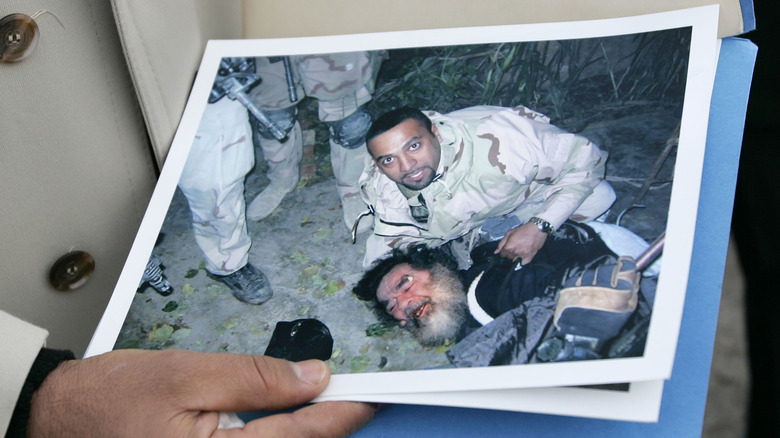Is This What The World Would Look Like If Saddam Hussein Hadn't Been Captured?
Reactions amongst the Iraqi population were mixed when U.S. soldiers along with British and other allied forces stormed Baghdad on April 9, 2003, and tore down dictator Saddam Hussein's statue in Firdos Square. As CNN outlines, many Iraqis were shocked, grateful, and in tears. Some younger Iraqis protested the involvement of foreign powers in domestic affairs. But no matter how we cut it, removing Hussein from power meant removing a highly dangerous, murderous tyrant from the world stage.
Hussein had been in power since 1979, and — like recently deposed Syrian madman Bashar al-Assad — brutalized, kidnapped, detained, tortured, and executed his own citizens. As the European Union Agency for Asylum outlines, Hussein slaughtered an estimated 182,000 Kurds from 1986 to 1989 in what many qualify as genocide. He gassed the Kurdish village of Halabja in 1988, deported 300,000 Kurds to Iran, killed 200,000 Shia Muslims in 1991, and more. Ultimately, U.S. special forces apprehended Hussein in his farmhouse hideout on December 13, 2003. His trial took place in Iraq in 2006, and he was executed for war crimes on December 30 that year.
Given the U.S.'s various and sordid incursions in the Middle East following 9/11, it's sometimes hard to remember that Saddam Hussein deserved to be deposed. If he'd stayed in power, for whatever reason, we could be looking at a very different Middle East in 2025. Doubtlessly, Hussein would have continued oppressing his own citizens, ramping up his weapons capabilities (especially considering his neighbor, Iran), swaying the balance of power in the region, and more.
More oppression, more brutality, more death
It might go without saying, but Iraq would be a very different place if Saddam Hussein had stayed in power. Before we look to consequences elsewhere, we have to look at the world through that lens.
Suffice it to say: The people of Iraq despised Hussein. Per CNN, 23-year-old Zaid Ridha said, "My father, my family felt that Saddam Hussein was not punished enough for his crimes. He has many, many terrible crimes. Not just only to Iraq, but also to our neighboring countries." Amina Ahmad, 27, said of life under a dictator, "We were afraid of only one person, [Hussein]. If you don't talk bad about him or his family, then you are safe." As The New York Times wrote in 2006, when Hussein was executed people were, "laughing, singing, crying, and holding pictures of dead loved ones to their chests." People like Iraqi Mohamed Hussein Ali said, "I feel satisfied that his blood [Ali's murdered brother] didn't go for nothing." Nonetheless, some people harbored mixed sentiments regarding not Hussein's death, but about how his execution was conducted on television, and what his fall from power represented about Iraq.
But in the end, it's pretty obvious what tack Hussein would have taken towards his people if he hadn't been caught, captured, and executed — barring some miraculous change in his person. There would have been oppression, more brutality, more fear, more torture, and more death. Removing Saddam Hussein from power doubtlessly saved thousands of Iraqi lives, perhaps even hundreds of thousands.
An eventual power vacuum
Even though we can safely assume that Saddam Hussein would have continued oppressing Iraqi citizens if he'd lived, he would have died eventually. Hussein was 69 when he was executed in 2006. Reports in 2003 indicated that his heath was "generally good," per The Guardian. Nonetheless, he had high blood pressure, took antibiotics for prostate infections, and refused cancer screenings. It's not a stretch to think that he might have died of natural causes by now, in 2025.
But even if Hussein had lived, not been captured, and died later, his sons would have been dead, anyway. Uday and Qusay Hussein both died in June 2003, six months before U.S. forces apprehended Hussein and two months after they'd seized Baghdad. Qusay, the younger brother, was Hussein's preferred successor because Uday was "too psychopathic" even for Hussein, per Time. Hussein also had three daughters, Raghad, Rana, and Hala. As of 2023 Raghad and Rana were living in Jordan, according to VOA, and even though Rana considered Hussein "compassionate," as The Guardian writes, Hussein also had her husband killed. There's absolutely no way to know if she or her sisters would or could have taken over power from their father, and if they would have ruled in the same manner as him.
The bottom line is this: Without a clear successor, Hussein's eventual, natural death would have left a power vacuum in Iraq. This would have created a struggle for power as a different leader, political party, or entire government rose to the top.
Political entanglements between neighboring countries
Before Saddam Hussein eventually died had he not been executed, his continued leadership would have changed the shape of the Middle East. Even only looking at events in neighboring countries in recent years — the Hamas terrorist attacks on Israel, Iran's funding of Hamas and fellow Islamist terrorists, Hezbollah, Israeli retaliation against all sides, the unrelated and recent fall of Syrian dictator, Bashar al-Assad, etc. – Hussein's presence in the region could have steered things in a very different direction.
But while it's tempting to think that adding Hussein to the mix would have automatically made things more dangerous for countries like Israel and the rest of the world, this isn't necessarily the case. Iraq — sandwiched between Saudi Arabia, Syria, and Iran — shares a tangled and bitter history with Iran. Hussein came into power in 1979, the same year that the Iranian Revolution changed the country after it fell into the hands of an oppressive theocracy. The very next year Hussein invaded Iran, kickstarting an eight-year-long war in which more than one million people were killed or wounded, driving both nations to hate each other.
It's impossible to say whether or not Hussein's continued reign would have weakened Iran, which would have caused ripples till the present and possibly weakened Hamas and Hezbollah, in turn, but it's a possibility. This is just one example of how the region would have descended further into entanglements if Hussein hadn't been captured. This is especially true as we take both Iraq's and Iran's potential nuclear capabilities into account.
The question of nuclear capability
In case folks need reminding, the supposed threat of "weapons of mass destruction" (WMDs) was the original, stated, well-known tagline for the United States and its allies invading Iraq back in 2003. That and "bringing democracy" to a country that didn't ask for it and shares none of the West's sociopolitical history, as Al Jazeera says.
But as we all know by now, there were no weapons of mass destruction in Iraq. We mentioned that Hussein gassed Kurdish citizens, and an Iraqi defector told U.S. intelligence in 2001 that Hussein harbored 20 different "chemical, biological and nuclear" facilities across the country, per The White House. But as Radio Free Europe explains, Hussein embellished tales of WMDs to try and intimidate his hated neighbors in Iran. To this end, he also misled and blocked arms inspectors, which only made the U.S. want to go after him more.
All this is to say: What would have happened on the WMD front if Hussein stayed in power and didn't get captured? There are countless scenarios, and none of them good. If Iraq and Iran got into a heated nuclear arms race, that would have been potentially catastrophic. Iran, alone, has been pushing towards nuclear capabilities for decades now, a fact that's very concerning to the West and nearby countries — especially given their funding of terrorist organizations. Could this have pushed Iraq to actually develop WMDs, and would the nations of the world have tried to shut down Hussein again? In this way, Hussein falling out of power removed a potential nuclear threat from the map.
A weakening of US and Western power
There would have been one final, indirect consequence to Saddam Hussein remaining in power and not getting caught: a shrinking of United States' and its allies' power and position in the eyes of the world. At present, the U.S.'s 20-year-long failure in the Middle East following 9/11 — including the 2003 invasion of Iraq — has already diminished the power and credibility of the United States in the eyes of much of the world. To many, it's reduced the U.S. to the status of global bully, or "global hegemony," as The Guardian writes.
So if the U.S. invaded Iraq in 2003, got as far as toppling the statue of Saddam Hussein in Firdos Square, took some of the iconic statue-falling pictures that we've all seen, and then scoured the countryside but couldn't find Hussein in his farmhouse hidey-hole? And then the U.S. military tucked tail and left Iraq with an I.O.U. stating "one uncaught dictator," on top of a distinct lack of WMDs? That would've amounted to embarrassment on top of insult and injury, especially if the U.S.' Middle Eastern democracy-granting expedition unfolded much the same as it did. And, you can be sure the U.S.' involvement in Iraq and the region would've generated even more domestic and international political blowback, plus some gloating on the part of the uncaught Hussein.
It's unknown how this further diminution of U.S. power — and Western power, by extension — would have impacted international relations and events across the world since then. But the impact would have been doubtless, perhaps even severe.
